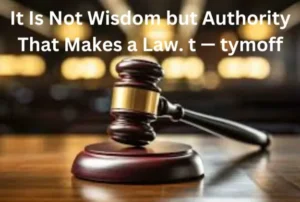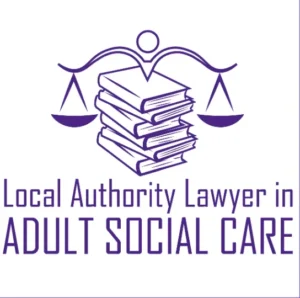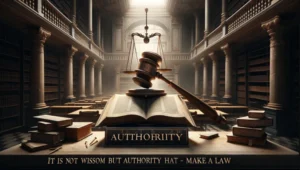It is not wisdom but authority that makes a law. T-Tymoff underscores the vital role of authority in legal systems.
Laws govern societies, ensuring order and justice. Authority, not wisdom, enforces these laws, providing structure and stability. Without authority, laws would lack the power to influence behaviour and maintain societal order. Wisdom may guide the creation of laws, but authority ensures their implementation.
This distinction highlights the importance of enforcement in legal frameworks. Authority gives laws their teeth, making them practical tools for governance. By understanding this principle, one can better appreciate the dynamics of legal systems and the crucial role of authoritative enforcement in maintaining societal harmony.
Contents
- 1 The Essence Of Tymoff’s Insight
- 2 Historical Context Of Legal Authority
- 3 Wisdom In Lawmaking: A Philosophical Perspective
- 4 Authority In Practice: Case Studies
- 5 The Interplay Between Wisdom And Authority
- 6 Legitimacy Of Law: Power Vs Morality
- 7 Modern Legal Systems And Tymoff’s Insight
- 8 Navigating The Future Of Lawmaking
- 9 Conclusion
The Essence Of Tymoff’s Insight

Tymoff‘s insight, “It is not wisdom but authority that makes a law,” delves into the core of legal and societal structures. This quote challenges the conventional belief that laws are rooted in wisdom. Instead, Tymoff argues that authority is the driving force behind the creation and enforcement of laws. Understanding this perspective can change how we perceive legal systems and governance.
Dissecting The Quote
To grasp Tymoff’s message, we must break down the quote. Wisdom refers to knowledge and good judgment. Authority means the power to enforce rules or give orders. Tymoff suggests that laws are only sometimes crafted from wisdom. Instead, those in power impose them.
Consider historical examples. Rulers have enacted many laws without wise counsel because they held authority. Their decisions shaped societies, sometimes without considering the well-being of the people.
Authority Vs. Wisdom
Authority and wisdom often conflict in law-making. Authority focuses on control and enforcement. It aims to maintain order, even if the laws are not wise. Wisdom, on the other hand, seeks the best outcomes for society. It values fairness and long-term benefits.
In many cases, laws are a blend of both authority and wisdom. But Tymoff’s quote reminds us that authority often overshadows wisdom. This realization prompts us to question the factual basis of our legal systems.
Key Differences:
- Authority: Enforces rules, maintains order, and can be arbitrary.
- Wisdom: Seeks fairness, values knowledge, and aims for the greater good.
Examples in History:
- Medieval monarchs: Laws based on royal decree, not public welfare.
- Colonial rulers: Imposed laws without local wisdom, focused on control.
Understanding these dynamics helps us see Tymoff’s point. Laws often stem from authority rather than wisdom, and this insight is crucial for analyzing and improving our legal systems.
Historical Context Of Legal Authority

Understanding the historical context of legal authority offers insight into how laws shape societies. Authority, rather than wisdom, often defines laws. This section explores the origins and evolution of legal systems.
Origins Of Law
The origins of law date back to ancient civilizations. Early laws were simple and based on customs.
Examples of early laws:
- Code of Hammurabi
- Ancient Roman Law
- Greek Legal Systems
These early legal codes laid the groundwork for modern laws. They were enforced by rulers, not based on wisdom but on authority.
Evolution Of Legal Systems
The evolution of legal systems shows the shift from simple to complex laws. As societies grew, so did their legal needs.
Critical stages in legal evolution:
- Tribal Customs
- Feudal Laws
- Modern Legal Codes
Legal systems became more structured and formalized. Authority figures, such as kings and governments, continued to shape laws. Wisdom was often secondary to the power wielded by these authorities.
Wisdom In Lawmaking: A Philosophical Perspective
In crafting laws, the balance between wisdom and authority is crucial. While authority enforces laws, wisdom guides their creation. This section delves into how philosophers view this balance and the role of wisdom in ensuring justice.
Philosophers On Law
Many philosophers have pondered the nature of laws. Plato believed laws should reflect the ideal forms of justice. He argued that wise rulers must draft laws for the greater good. In contrast, Aristotle emphasized laws should be practical and rooted in reality. He viewed laws as tools to achieve a balanced society.
John Locke focused on natural rights. He argued that laws must protect these inherent rights. Immanuel Kant stressed the importance of moral imperatives. He believed laws should align with universal moral principles.
Wisdom’s Role In Justice
Wisdom in lawmaking ensures that laws are just and fair. Without wisdom, laws may become oppressive. Wise laws consider the well-being of all citizens and balance individual rights with the common good.
Wise lawmakers understand the complexities of human behaviour. They create laws that are flexible yet firm. This balance prevents tyranny and promotes justice. Wisdom in lawmaking is not ideal but necessary for a just society.
| Philosopher | Key Belief |
| Plato | Laws should reflect ideal justice. |
| Aristotle | Laws should be practical and balanced. |
| John Locke | Laws must protect natural rights. |
| Immanuel Kant | Laws should align with moral principles. |
Wisdom in lawmaking ensures laws serve all people fairly. Authority alone cannot achieve this. It is wisdom that makes laws effective.
Authority In Practice: Case Studies

Authority shapes laws more than wisdom. This section explores real-life examples. By examining these cases, we understand how authority impacts legislation.
Notable Laws And Authority
Authority often drives the creation of laws. Here are some notable examples:
- The Patriot Act: Increased surveillance post-9/11.
- Prohibition: Banned alcohol in the 1920s.
- Jim Crow Laws: Enforced racial segregation.
Each law shows how authority can create impactful regulations. These laws were not necessarily wise but carried significant power.
Consequences Of Authority-driven Laws
Authority-driven laws often have far-reaching consequences. Some are positive, while others are negative. Let’s examine these:
| Law | Positive Outcomes | Negative Outcomes |
| The Patriot Act | Improved national security | Reduced personal freedoms |
| Prohibition | Reduced alcohol consumption | Increased organized crime |
| Jim Crow Laws | None | Institutionalized racism |
These examples show that authority-driven laws can have diverse effects. Authority can lead to both beneficial and harmful outcomes. Evaluating these laws helps us understand their true impact.
The Interplay Between Wisdom And Authority
Understanding the delicate dance between wisdom and authority in lawmaking is crucial. Authority enforces laws, while wisdom guides their creation. This balance ensures justice and fairness.
Balancing The Scales
Balancing wisdom and authority is like a scale. Authority ensures laws are followed. Wisdom ensures laws are fair and just. Without wisdom, authority may become oppressive. Without authority, wisdom lacks power. Both are essential for a harmonious society.
Let’s look at how wisdom and authority balance in different scenarios:
| Scenario | Role of Wisdom | Role of Authority |
| Creating new laws | Ensures laws are just and beneficial | Implements and enforces the new laws |
| Judicial decisions | Provides fair judgments | Ensures judgments are enforced |
| Policy making | Guides policy direction | Implements policy |
Conflicts And Resolutions
Conflicts arise when wisdom and authority clash. Wisdom may suggest a compassionate approach, while authority may demand strict enforcement. Resolving these conflicts requires dialogue and compromise. Both sides must work together for the greater good.
Here are some common conflicts and their resolutions:
- Conflict: A law is seen as unfair.
- Resolution: Review and amend the law using wisdom.
- Conflict: Strict enforcement causes public unrest.
- Resolution: Adjust enforcement strategies while maintaining order.
Legitimacy Of Law: Power Vs Morality
Is it authority or wisdom that makes a law? The legitimacy of law often sparks debate. Understanding the balance between power and morality helps in this quest. Let’s delve deeper into this intriguing topic.
Moral Foundations Of Law
Laws are often rooted in moral principles. These principles guide our sense of right and wrong. They help us understand justice and fairness. Morality offers a foundation for creating laws that serve the common good.
Consider these moral principles:
- Honesty: Encourages truthfulness and transparency.
- Equality: Promotes fair treatment for all individuals.
- Responsibility: Ensures individuals are accountable for their actions.
These principles shape laws that protect society. They ensure everyone enjoys their rights and freedoms. Morality provides a guiding light for lawmakers.
Power Dynamics In Legal Enactment
While morality influences law, authority often enforces it. Power dynamics play a crucial role in legal enactment. Those in power can create, change, and enforce laws.
Key Power Dynamics:
| Aspect | Influence |
| Government | Enacts and enforces laws. |
| Judiciary | Interprets laws and ensures justice. |
| Law Enforcement | Implements laws and maintains order. |
Authority figures use their power to shape society. They create laws that reflect their vision. This can sometimes lead to conflicts between power and morality.
A law must balance moral principles with authority to be legitimate. This ensures justice is served while maintaining societal order.
Modern Legal Systems And Tymoff’s Insight

- Tymoff famously stated, “It is not wisdom but authority that makes a law.” In modern legal systems, this idea holds substantial weight. Understanding Tymoff’s insight helps evaluate current legal frameworks and sheds light on the role of authority in shaping laws.
Contemporary Examples
Modern legal systems, like those in the United States, the United Kingdom, and India, reflect Tymoff’s thoughts. Authoritative bodies like parliaments and congresses often enact laws. These laws may not always stem from wisdom but from power and control.
| Country | Authoritative Body | Example Law |
| United States | Congress | Patriot Act |
| United Kingdom | Parliament | Brexit Law |
| India | Parliament | Citizenship Amendment Act |
Relevance In Today’s Governance
Tymoff’s insight remains relevant in today’s governance. Authority often dictates the creation and enforcement of laws, which impact citizens’ daily lives. This can be observed in international treaties, trade agreements, and national security laws.
In a democratic setting, elected officials use their authority to enact laws. These laws might prioritize national interests over individual wisdom, highlighting Tymoff’s point about the significant role of authority in lawmaking.
- Authority shapes laws more than wisdom does.
- Modern legal systems reflect this principle.
- National interests often drive authoritative decisions.
The future of lawmaking holds great potential for change. New methods for creating and enforcing laws are emerging with advancements in technology and society. The balance between wisdom and authority will shape how laws are crafted and applied. Let’s explore how we can integrate wisdom into authority and the prospects for reform.
Incorporating Wisdom Into Authority
Wisdom helps make better decisions. It brings experience and understanding to the table. Authority enforces rules and ensures compliance. Combining these two elements can lead to better laws.
Three ways to incorporate wisdom into authority:
- Consult experts in various fields for well-rounded perspectives.
- Engage communities to understand their needs and concerns.
- Use data to inform decisions and predict outcomes.
Creating laws with wisdom ensures they are fair and effective. It also helps build trust in the legal system.
Prospects For Reform
The future of lawmaking looks promising, with many opportunities for reform. Reforms can make laws more just and relevant to today’s world.
Potential areas for reform:
- Updating outdated laws to reflect current realities.
- Simplifying legal language for better public understanding.
- Implementing technology to streamline legal processes.
Reforming laws can improve accessibility and efficiency. It can also ensure that laws serve the public good.
| Aspect | Current State | Future Prospects |
| Law Creation | Authority-driven | Wisdom-integrated |
| Public Engagement | Limited | Expanded |
| Technology Use | Minimal | Advanced |
Focusing on these areas can help us navigate the future of lawmaking effectively, ensuring that laws are wise and authoritative.
Conclusion
Authority shapes the laws that govern society, not wisdom. Understanding this distinction is crucial for meaningful change. Embrace your role in advocating for just laws. Empower yourself with knowledge and take action. Only through collective effort can we create a fair and equitable legal system.
>>>Also Read About: memphis grizzlies vs new orleans pelicans match player stats




